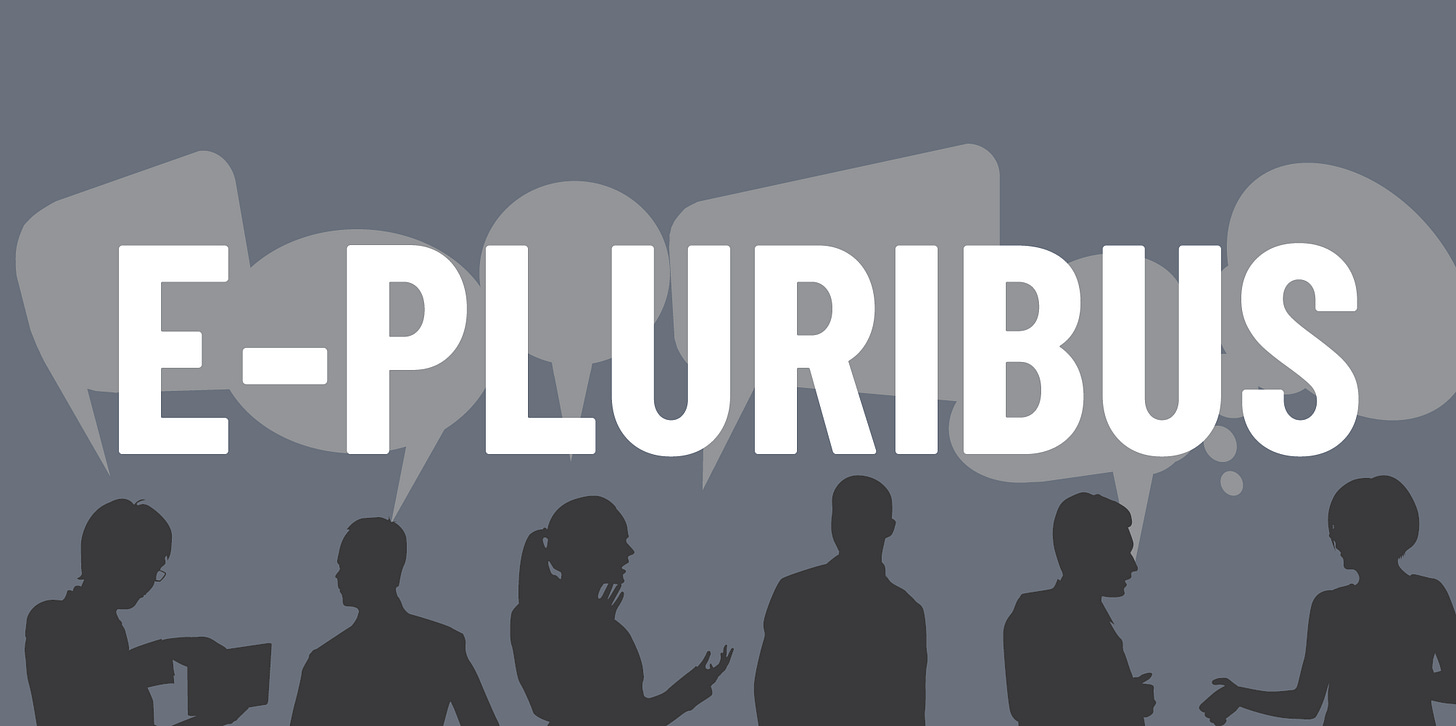E-Pluribus | August 19, 2024
Come on, lighten up; the politics of guilt; and the First Amendment isn't just for individuals.
A round-up of the latest and best musings on the rise of illiberalism in the public discourse:
Ingrid Jacques: No laughing matter: Humorless scolds on the left want to silence your 'offensive' views
The problem with banning “hate speech” and “misinformation” isn’t that anyone is necessarily in favor of them; it’s that’s nobody seems to agree about what those words mean, and probably never will. At USA Today, Ingrid Jacques points out one of the potential unintended consequences of such a ban — satire and parody would clearly be at risk.
“There’s no guarantee to free speech on misinformation or hate speech and especially around our democracy,” [Tim Walz] told MSNBC.
Walz is wrong. We do have a broad guarantee of free speech under the U.S. Constitution, and that includes misinformation and hate speech. Walz probably missed the irony, but his misinformation on free expression is protected speech.
[. . .]
Unfortunately, Walz is not alone in his views. Many on the left – and some on the right – are turning to the government to regulate (or force, in the case of Florida and Texas laws) speech that some may find offensive.
That is antithetical to one of this country’s most important values.
[. . .]
In France, “Harry Potter” author J.K. Rowling and Tesla founder Elon Musk have been named in a criminal complaint from Algerian boxer and recent Olympic gold-medal winner Imane Khelif over alleged “acts of aggravated cyber harassment.”
Their “crime”? Contributing to the discussion over whether it was fair for Khelif to compete against women, after being disqualified from a previous competition because of questions related to Khelif’s sex.
[. . .]
“The First Amendment protects things like satire and parody which have, of course, deep roots in American history and could be potent forms of political or social criticism,” says Aaron Terr, director of public policy for the Foundation for Individuals Rights and Expression (FIRE). “And that's especially true when politicians or other public figures are on the receiving end.”
FIRE is representing the plaintiffs, which include First Amendment scholar and blogger Eugene Volokh, in a lawsuit against a New York law that seeks to target “hateful” speech but is overly broad in its expectations of what online platforms should be expected to do to combat the offending speech.
In practice, the law would chill protected speech for fear of retribution – not unlike the “bias response teams” on public university campuses that encourage students to spy on each other and that have faced similar legal challenges.
[. . .]
Does satire have the ability to offend or make people uncomfortable? Sure. That’s the point. And to open it up to government oversight is a huge problem.
As the author Salman Rushdie, who faced an assassination attempt and near death for his own views, has observed, it’s vital to “defend the art of satire, which has always been a force for liberty and against tyranny, dishonesty and stupidity.”
Read the whole thing.
Renu Mukherjee: White Guilt Is Out of Date
The horrors of slavery and subsequent decades of injustice brought on by Jim Crow laws and socially accepted racism cannot be denied. But writing for City Journal, Renu Mukherjee says it’s time to put guilt for the sins of ours fathers behind us and acknowledge the enormous progress our country has made.
Four years ago, Joe Biden, then the Democratic Party’s presumptive nominee for the 2020 presidential election, promised to select a black woman as his running mate. He settled on Kamala Harris, a senator from California and the daughter of Jamaican and Indian immigrants. “Little black and brown girls, who so often feel overlooked and undervalued in their communities, but today, today just maybe, they’re seeing themselves for the first time in a new way, as the stuff of president and vice presidents,” Biden said then.
Now, Harris has supplanted Biden atop the Democrats’ 2024 ticket after the president’s stunning withdrawal. Notably, however, Biden’s endorsement of Harris last month made no mention of her race, ethnicity, or gender. Some Democrats do want to make Harris’s racial and ethnic background the focus of her 2024 presidential campaign. By and large, these haven’t been top-ranking party officials, but rather progressive racial activists—particularly black and white women.
[. . .]
Both the black and white groups expressed interest in voting for Harris, at least in part, because of her racial, ethnic, and gender identity. Yet, while #WinWithBlackWomen appeared to be hopeful and excited, its white counterparts seemed motivated by guilt and shame.
“White guilt,” the idea that white Americans should feel ongoing remorse for the opportunities, privileges, and relative ease that their group enjoyed prior to the Civil Rights Movement, is not new. It has been an explicit tenet of critical race theory for decades, and it was central to the so-called antiracism efforts of activists such as Robin DiAngelo and Ibram X. Kendi during the 2020 Black Lives Matter protests. The belief that whites should feel such guilt—predicated on the idea that white men and women have more power and opportunity than racial minorities in America in 2024—is not only condescending and arrogant but also racist.
[. . .]
Rejecting white guilt does not, of course, imply that one believes that America is perfect. The United States has periodically failed to uphold its founding promise of liberty, equality, and opportunity for all. To dismiss the need for white guilt today is not to deny those past injustices but to assert that the promises of America belong equally to racial minorities and their white peers. For proof, we need only look to Kamala Harris.
Read it all here.
Seth Moskowitz: Big Tech Companies Have Free Speech Rights Too
“Corporations are people” is a concept often mocked by the left in particular, but for certain applications of the law, it’s undeniable. Free speech per the First Amendment is one such application, writes Seth Moskowitz at Persuasion, and much-maligned tech companies must be included under its protection.
There is a near consensus in politics and media these days that Big Tech, and social media in particular, is bad for America. The left has been skeptical of these platforms ever since Hillary Clinton’s loss to Donald Trump in 2016, blaming them for allegedly allowing Russian misinformation to influence the election results. The Republican Party only really started to turn on these platforms in 2020 and 2021, as they began implementing increasingly censorial content moderation policies.
In this hostile environment, Florida and Texas passed legislation restricting how social media sites could moderate user-generated content. The laws, in the words of Supreme Court Justices Barrett, Sotomayor, and Jackson, are “sprawling,” “broad,” and “susceptible to multiple interpretations.” But their general thrust is to reach deep into the product design of sites like Facebook, X, and YouTube to curtail their ability to ban users, filter content, and rank posts.
[. . .]
[F]rustration is not a good reason to overlook violations of the First Amendment or to make excuses for poorly crafted, reckless legislation. Unfortunately, that is precisely what critics of the Supreme Court’s opinion have done—inventing intricate explanations for why the Texas and Florida laws don’t violate the Constitution. But their tortured justifications fall flat when put up against the straightforward argument on the other side: social media platforms are engaged in expression and therefore enjoy First Amendment protections. No amount of legal gymnastics can make those protections disappear, and the Supreme Court was right to say as much.
[. . .]
In an attempt to skirt those First Amendment protections, proponents of social media regulation argue that we should treat these platforms like we do airlines or railroads—as so-called “common carriers” who are required to serve all comers without discrimination. For example, the Texas law says that because “social media platforms function as common carriers,” they should not be allowed to “censor a user” or “otherwise discriminate against expression.” Sam touched on the same idea, arguing that the Supreme Court should have depicted social media platforms as common carriers and allowed the government to regulate their use of “discriminatory algorithms.”
But “common carrier” is not an incantation that magically strips an entity of its First Amendment protections. This point was hammered home repeatedly during oral arguments, including by both Texas’s and Florida’s solicitors general, who acknowledged that common carriage rules cannot be used to shut down an entity’s right to its own speech. The problem for Texas and Florida is that—as the Supreme Court rightly decided—creating curated newsfeeds and timelines falls directly under that umbrella of protected speech. And so even if the government could use common carrier status to regulate the companies in some ways (requiring them to allow anybody to make an account for browsing or direct messaging, for example), the platforms would still maintain the First Amendment right to produce their newsfeeds and timelines as they see fit.
Read it all.
Around Twitter (X)
Here’s a flashback from Heterodox Academy on how Harvard used to see its job:
The Foundation for Individual Rights and Expression makes the case that a proposed Texas law requiring IDs or other personal information to access certain websites violates the First Amendment:
And finally, Zaid Jilani asks what the Democrats are trying to say to Native Americans with the “land acknowledgement” in their party platform:



